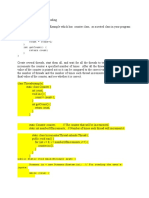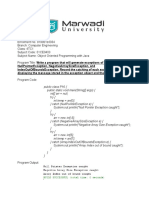0% found this document useful (0 votes)
11 views7 pagesProgram's Solution
Uploaded by
Chandrasekhar SaiCopyright
© © All Rights Reserved
We take content rights seriously. If you suspect this is your content, claim it here.
Available Formats
Download as TXT, PDF, TXT or read online on Scribd
0% found this document useful (0 votes)
11 views7 pagesProgram's Solution
Uploaded by
Chandrasekhar SaiCopyright
© © All Rights Reserved
We take content rights seriously. If you suspect this is your content, claim it here.
Available Formats
Download as TXT, PDF, TXT or read online on Scribd
/ 7




































































































